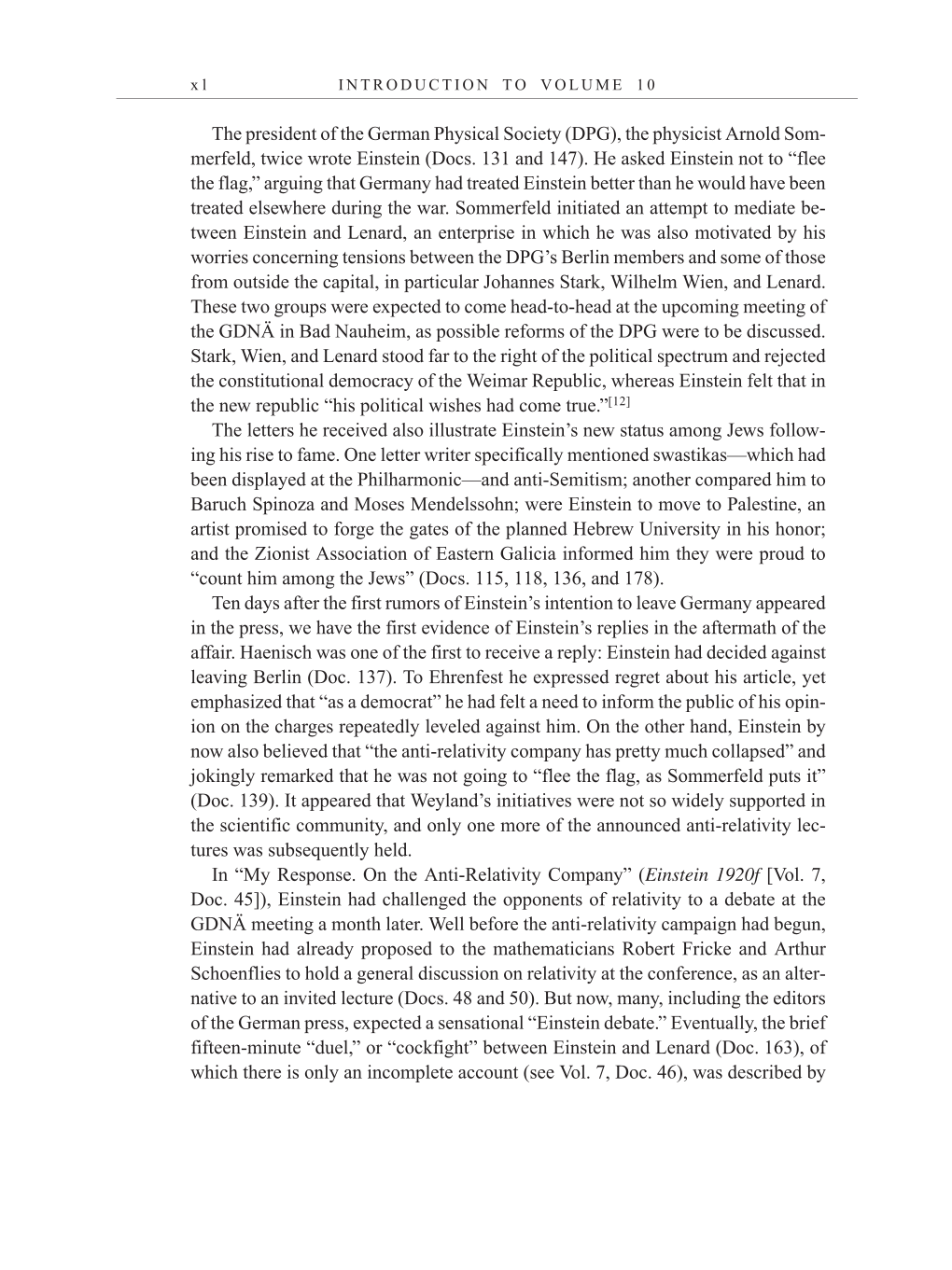x l I N T R O D U C T I O N T O V O L U M E 1 0
The president of the German Physical Society (DPG), the physicist Arnold Som-
merfeld, twice wrote Einstein (Docs. 131 and 147). He asked Einstein not to “flee
the flag,” arguing that Germany had treated Einstein better than he would have been
treated elsewhere during the war. Sommerfeld initiated an attempt to mediate be-
tween Einstein and Lenard, an enterprise in which he was also motivated by his
worries concerning tensions between the DPG’s Berlin members and some of those
from outside the capital, in particular Johannes Stark, Wilhelm Wien, and Lenard.
These two groups were expected to come head-to-head at the upcoming meeting of
the GDNÄ in Bad Nauheim, as possible reforms of the DPG were to be discussed.
Stark, Wien, and Lenard stood far to the right of the political spectrum and rejected
the constitutional democracy of the Weimar Republic, whereas Einstein felt that in
the new republic “his political wishes had come
true.”[12]
The letters he received also illustrate Einstein’s new status among Jews follow-
ing his rise to fame. One letter writer specifically mentioned swastikas—which had
been displayed at the Philharmonic—and anti-Semitism; another compared him to
Baruch Spinoza and Moses Mendelssohn; were Einstein to move to Palestine, an
artist promised to forge the gates of the planned Hebrew University in his honor;
and the Zionist Association of Eastern Galicia informed him they were proud to
“count him among the Jews” (Docs. 115, 118, 136, and 178).
Ten days after the first rumors of Einstein’s intention to leave Germany appeared
in the press, we have the first evidence of Einstein’s replies in the aftermath of the
affair. Haenisch was one of the first to receive a reply: Einstein had decided against
leaving Berlin (Doc. 137). To Ehrenfest he expressed regret about his article, yet
emphasized that “as a democrat” he had felt a need to inform the public of his opin-
ion on the charges repeatedly leveled against him. On the other hand, Einstein by
now also believed that “the anti-relativity company has pretty much collapsed” and
jokingly remarked that he was not going to “flee the flag, as Sommerfeld puts it”
(Doc. 139). It appeared that Weyland’s initiatives were not so widely supported in
the scientific community, and only one more of the announced anti-relativity lec-
tures was subsequently held.
In “My Response. On the Anti-Relativity Company” (Einstein 1920f [Vol. 7,
Doc. 45]), Einstein had challenged the opponents of relativity to a debate at the
GDNÄ meeting a month later. Well before the anti-relativity campaign had begun,
Einstein had already proposed to the mathematicians Robert Fricke and Arthur
Schoenflies to hold a general discussion on relativity at the conference, as an alter-
native to an invited lecture (Docs. 48 and 50). But now, many, including the editors
of the German press, expected a sensational “Einstein debate.” Eventually, the brief
fifteen-minute “duel,” or “cockfight” between Einstein and Lenard (Doc. 163), of
which there is only an incomplete account (see Vol. 7, Doc. 46), was described by
